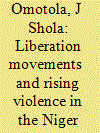| Srl | Item |
| 1 |
ID:
099188


|
|
|
|
|
| Publication |
2010.
|
| Summary/Abstract |
This article analyses the impact of elections and particularly their administration on Nigeria's democratization process. It argues that elections under the Fourth Republic (1999-2007) were characterized by ineffective administration at all stages and levels (before, during and after), resulting in damagingly discredited outcomes. This was due in large part to the weak institutionalization of the primary agencies of electoral administration, particularly the Independent National Electoral Commission (INEC) and the political parties. INEC lacks both institutional and administrative autonomy, as manifested by its composition and funding by the presidency, as well as its gross lack of professionalism and security of tenure for its officials. Elections can only engender the consolidation of democracy in Nigeria if the electoral processes are reformed in ways that fundamentally address the autonomy and capability of INEC and related electoral agencies, particularly political parties, to discharge their responsibilities effectively. The recent trend towards challenging electoral fraud in the courts, however, does signal a strengthening of the rule of law and gives some reason for optimism.
|
|
|
|
|
|
|
|
|
|
|
|
|
|
|
|
| 2 |
ID:
094765


|
|
|
|
|
| Publication |
2010.
|
| Summary/Abstract |
The contest for the 'soul' of oil and its revenues in Nigeria have thrown up several actors representing diverse interests, most notably the stale, oil multinationals and oil-hearing communities. This paper is primarily concerned with what it called the new contentious site of oil and environmental polities in the Niger Delta. The contention revolves mainly around the interpretations ascribed to the current but unprecedented wave of violence in the region by the contending forces in oil and environmental politics. In the reading of militias' activities, there is a simultaneous convergence and divergence between the state and the oil majors. Both refuse to attribute rising violence to liberation struggles, as claimed by the militants. They, however, differ over the best tactical approach to the problem. The oil majors seem to prefer a more violent approach to taming the monster, which violence in the Niger Delta has become. This is in sharp contradiction to the states' preference for a relatively less violent approach. This 'new' disposition of the state makes it all the more interesting, given the fact that the Nigerian state is notoriously reputed for its excesses in the Niger Delta over dissent. Overall, rising violence in the Niger Delta represents the continuation of the resource struggle by another means. Notable criminal tendencies became inevitable due to the insensitivity of the government and in order to sustain the struggle.
|
|
|
|
|
|
|
|
|
|
|
|
|
|
|
|